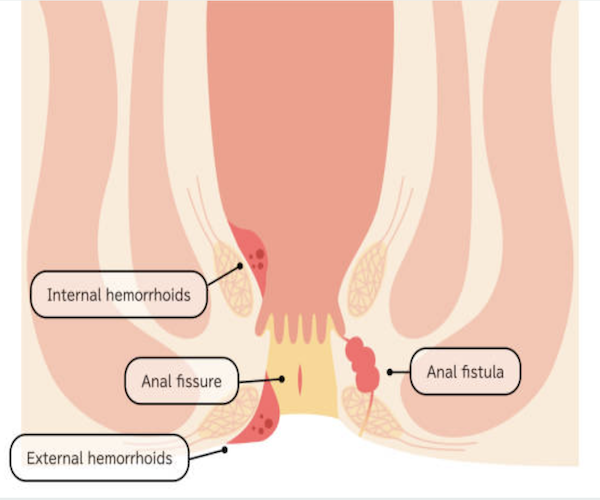
Understanding Anorectal Disorders
Anorectal disorders are medical conditions that affect the anus and rectum, the lower part of the digestive system where stool exits the body. These disorders are very common and can cause symptoms like pain, bleeding, itching or discomfort, especially during or after bowel movements.
While many anorectal conditions are not life-threatening, they can significantly impact your quality of life if left untreated. Some may even lead to complications if ignored. The good news is that most of these conditions are treatable with the right care.
If you are experiencing symptoms like rectal pain, bleeding or changes in bowel habits, it is important to seek medical advice. Early diagnosis and treatment can help you feel better faster and prevent more serious issues down the road.
Common Anorectal Disorders we treat:
- Piles / Hemorrhoids: Swollen veins in the rectum or anus that can cause pain, itching, bleeding, or a feeling of fullness. They can be internal or external.
- Anal Fissures: Small tears in the lining of the anus, often caused by passing hard stools. They cause sharp pain and bleeding during bowel movements.
- Anal Fistulas: Abnormal tunnels that form between the inside of the anus and the skin around it, usually due to infection or abscess. They often require surgery.
- Anorectal Abscess: A painful, pus-filled lump near the anus or rectum caused by an infection in a gland. Often accompanied by swelling, redness and fever.
- Rectal Prolapse: A condition where part of the rectum slips outside the anus. It may cause discomfort, leakage or a visible bulge during bowel movements.
- Pilonidal Disease: A cyst or abscess that forms near the tailbone, often containing hair and skin debris. It can become painful and infected.
Are you noticing these symptoms?
- Pain during or after bowel movements
- Rectal bleeding
- Itching or burning around the anus
- Swelling or lumps
- Discharge or pus
- Bowel movement difficulties
Why do anorectal disorders happen?
- Constipation or straining
- Diarrhea
- Poor hygiene
- Infection or inflammation
- Trauma
- Childbirth
- Obesity
- Sedentary lifestyle
How anorectal disorders are diagnosed?
- Physical examination
- Digital rectal exam (DRE)
- Anoscopy
- Imaging tests (Ultrasound, MRI)
- Colonoscopy (if needed)